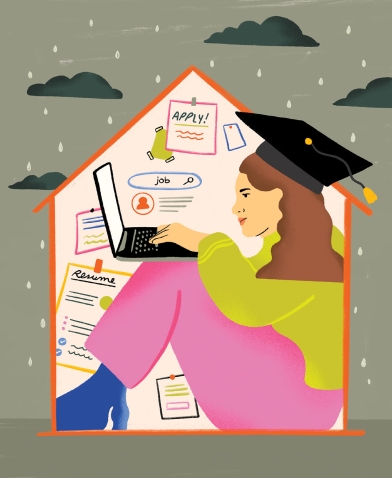“What are you doing after graduation?” It’s a loaded question to ask a Wellesley senior, even in normal times. Will you pursue graduate school? Look for a job? Get an apartment? How will you cope with living on your own for the first time, without the safety net of college or parents?
But a global pandemic makes answering those questions even more complex. Moving back home with your family is common (and extended). You’re still expected to get a job or go to graduate school or, you know, figure things out, but everything is harder. The economy? Not great. The job offers that usually come during your senior year? Delayed. The actual jobs? Also delayed. And when jobs are acquired and start dates set, the actual work is … remote.
“My desk is four and half feet from the bed I sleep in … my world is very small,” says Catie Kenyon ’20.
Graduates from the classes of 2020 and 2021 are entering the workforce during a historic time, grappling with a global issue while also living their local lives. “We saw students making very different decisions, living in different parts of the country, many going home, and not having the same early career start that I think many of our students did before,” says Jennifer Pollard, associate provost and executive director of Career Education at Wellesley.
For these graduates, not much looks the same as it did before.
This didn’t go according to plan
For many Wellesley alumnae, senior year is a fond memory. (It’s easy to gloss over the chaos and fear once you’re out of it.) There are traditions like Hooprolling and Stepsinging and Senior Week to ease you into the notion of leaving Wellesley for good. For the class of 2020, it was less of a transition and more of a sudden shock when the campus closed abruptly in March 2020 due to the pandemic.
“I very much wanted to enjoy my senior spring,” says Kalyani Saxena ’20. “So, I was applying to jobs, sending out cover letters for entry-level positions, thinking, ‘I’ll get around to it, I still have two months before I graduate.’” She laughs. “Obviously, that didn’t happen.”
At first, it was unclear how long the closure would last. Hope to be back on campus in time for commencement was held onto, then it slipped away. “You just felt this overwhelming sense of hopelessness. The world is falling apart, and I’m about to graduate college. At the time, the economy was tanking,” Saxena says. “It was really terrifying to look at that, and think, ‘Oh, it maybe isn’t going to work out, and I don’t know if it’s ever going to be OK again.’”
For some, worrying about the fate of the world actually eased the pressure of worrying about their state of employment. Before the pandemic, there was a lot of pressure to find a job, but in some ways, the crisis changed that, Andrea Marenco ’20 says. “When I graduated in May, I felt uncertain about what I wanted to do after graduating, and I felt more uncertain because of everything going on with the coronavirus,” she says. “When the coronavirus happened, it seemed like it didn’t really matter that much.”
So, Marenco took some time that summer to consider her next steps, which became a common theme for 2020 graduates, whether they wanted to or not.

You may experience some delays
In a typical year, about 50% of the Wellesley students who will be entering the workforce after graduation have offers in hand in the spring of their senior year, Pollard says. The class of 2020 was no different—until it was. Those in Career Education worried about two potential problems for the class at that point: rescinded offers and the effects of widespread hiring freezes.
“We didn’t see rescinded offers for our students, we saw delayed starts,” Pollard says. “That created an entirely new problem, where most of the students who had offers in hand were getting bumped to August, September, October, November of 2020.” Those who were still searching for jobs faced similar issues. Career Education worked with alumnae to help. “We started to create these post-grad internships through the Hive and through our Wellesley alumnae … to bridge that gap for students and help them to build their network,” Pollard says. These were short internships, typically between two and four weeks, and could be completed virtually. They offered graduates a chance to test out different industries, gain experience, and make connections. “Those led to a lot of jobs for our students,” Pollard says.
The delayed starts for the class of 2020 had a ripple effect, however, pushing back the timeline for many in the class of 2021. Although that delayed recruiting efforts from the fall to the spring, the class of 2021 did benefit from what Career Education had learned from 2020. “In the class of 2020, we started building the network and mentorship … right at the time of graduation. The class of 2021, we started the moment they got back to campus their senior year, so they started participating in virtual pod mentorship, where we had three to four alums partnered with three to four students,” Pollard says. Career Education is working to expand the program—in September, alumnae were invited via email to join the Wellesley MAP (Mentorship Affinity Pods) Program.
Not for the faint of heart
Making those connections and getting advice was critical for many graduates, whether or not they led directly to a job. Marenco returned home to Atlanta and was considering applying to law school. “I felt like there wasn’t really much out there for me,” she says. “I was living at home with my parents, and I didn’t really know what I wanted to do, and I felt like I should just try to go to grad school.” But she connected with several Wellesley lawyers, who advised something different: She should work in a law firm to try it out.
In September 2020, she started researching and applying to different firms focused on immigration law. “I was interested in any kind of law that was more social-justice oriented,” Marenco says. In October, she was offered a position as a legal assistant with an immigration law firm in New York, but the coronavirus had a surge at that point, and she didn’t want to leave her family. The firm came back with an offer for remote work, and she started a full-time position in December 2020.
Getting to a full-time staff position took a bit longer for other 2020 graduates, although making connections and networking was still critical. Saxena wanted to work as a journalist, a field with no recruitment efforts and high barriers to entry, particularly for people of color. “I didn’t see a path for me to get from graduation to full employment,” she says. “I already felt like I was going off the beaten path, and suddenly someone came and erased the path and destroyed the road that I was standing on.” She felt paralyzed and struggled to even apply for positions, but with the support of her family (yes, she too had returned home), she started applying for anything related to her field.
Saxena was contacted by a politics podcast launching that year and was offered work, albeit unpaid. “A lot of applicants of color … you start to believe that they’d never hire you with money and a salary, like you’re not worthy of a full-time staff position, so you continue to accept positions for which you’re overqualified because you think that’s what you deserve,” she says. “That’s a terrible trap that a lot of journalists of color fall into, myself included, and I think the pandemic only made it worse.” While working this unpaid position, Saxena also applied for an internship at NPR. “I spent a lot of time on my cover letter and networking with people at NPR,” or “cold-DMing,” as she puts it. That work paid off, and she was an NPR intern on the Washington desk through the 2020 election. After that, she was offered a contract position on NPR’s All Things Considered, which she did for seven months, and then, at last, she was offered a full-time staff position. She’s now an associate producer for WBUR on Here & Now.
Catie Kenyon ’20 took a similar road to full-time employment after graduating. After interning with the U.S. Mission to the United Nations (USUN) in the summer of 2019, Kenyon had applied in early 2020 to return to that work, before the pandemic threw everything up in the air. Uncertain about her job prospects, Kenyon reached out to Career Education for guidance. “To be honest, I applied to dozens of jobs … and heard back from one of them,” Kenyon says. Through the Hive, she connected with an alumna who suggested she look for work with a congressional campaign, which she did. Unfortunately, all they had was unpaid work, but she took it anyway. After she had worked there for about seven weeks, Kenyon was contacted by the USUN and offered a temporary assistant position in the fall. That led to her current job as a full-time program assistant.








We ask that those who engage in Wellesley magazine's online community act with honesty, integrity, and respect. (Remember the honor code, alums?) We reserve the right to remove comments by impersonators or comments that are not civil and relevant to the subject at hand. By posting here, you are permitting Wellesley magazine to edit and republish your comment in all media. Please remember that all posts are public.